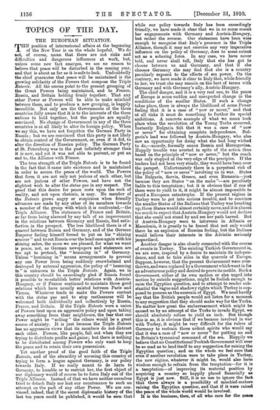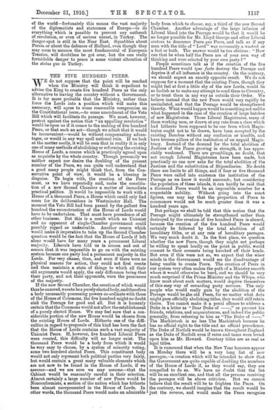TOPICS OF THE DAY.
THE EUROPEAN SITUATION.
HIRE the New Year is on the whole hopeful. We do position of international affairs at the beginning not, of course, mean that there are not risks and difficulties and dangerous influences at work, but, unless some new fact emerges, we see no reason to believe that peace will be disturbed in the coming year, and that is about as far as it is safe to look. Undoubtedly the chief guarantee that peace will be maintained is the growing solidarity of the Powers that compose the Triple Entente. All the omens point to the present grouping of the Great Powers being maintained, and to France, Russia, and Britain holding firmly together. That any other Power or Powers will be able to make mischief between them, and to produce a new grouping, is happily incredible. Not only are the Governments of the three countries fully aware that it is to the interests of the three nations to hold together, but the peoples are equally convinced. No change of Government in any of the three countries is at all likely to alter its foreign policy. When we say this, we have not forgotten the German Part in Russia ; but we are convinced that this party is not l ely to obtain control of the Government, or, even if it did, to alter the direction of Russian policy. The German Party at St. Petersburg was in the past infinitely stronger than it is now, and yet it was not able to prevent, or put an end to, the Alliance with France.
The true strength of the Triple Entente is to be found in the fact that it came into existence and is maintained in order to secure the peace of the world. The Powers that form it are not only not jealous of each other, but are not jealous of other Powers, and have not the slightest wish to alter the status quo in any respect. The proof that this desire for peace rests upon the rock of reality, and not upon rhetoric, is easy. No member of the Entente grows angry or suspicious when friendly advances are made by any other of its members towards a member of the group with which it is confronted,—the Triple Alliance. The statesmen of France and Britain, so far from being alarmed by any talk of an improvement in the relations between Germany and Russia, find satis- faction in the prospect. The less likelihood there is of a quarrel between Russia and Germany, and of the German Emperor feeling himself forced to put on his " shining armour " and to cut Russia over the head once again with his shilling sabre, the more we are pleased, for what we want is peace, not, as German newspapers and statesmen are too apt to pretend, the " hemming in" of Germany. Unless "hemming in" means arrangements to prevent any one Power from being suddenly overwhelmed and destroyed by external aggression, the policy of " hemming in " is unknown to the Triple Entente. Again, we in this country should be exceedingly glad if Russia found it possible to re-establish better relations with Austria- Hungary, or if France continued to maintain those good relations which have usually existed between Paris and Vienna. Whatever tends to make the Powers content with the status quo and to stop restlessness will be welcomed both individually and collectively by Russia, France, and Britain. If the Triple Entente were a union of Powers bent upon an aggressive policy and upon taking away something from their neighbours, the fear that one Power might be " selling " the others would be a great source of anxiety. It is just because the Triple Entente has no aggressive views that its members do not distrust each other. Powers, like people, fall out when they are trying to distribute profits and gains; but there is nothing to be distributed among Powers who only want to keep the peace and to retain their own possessions.
Yet another proof of the good faith of the Triple Entente, and of the absurdity of accusing this country of trying to form a league against Germany, is our policy towards Italy. If we really meant to do harm to Germany, to humble or to restrict her, the first object of our diplomacy would of course be to force Italy out of the Triple Alliance. Instead of that we have neither ourselves tried to detach Italy nor lent our countenance to such an attempt on the part of any other Power. We are con- vinced, indeed, that if the secret diplomatic history of the last ten years could be published, it would be seen that while our policy towards Italy has been exceedingly friendly, we have made it clear that we in no sense resent her engagements with Germany and Austria-Hungary, but rather the reverse. Our statesmen have been wise enough to recognise that Italy's presence in the Triple Alliance, though it may not exercise any very imperative influence on the policy of Germany, does to some extent act as a sobering force. In any case, we have never told, and never shall tell, Italy that she has got to choose between us and Germany, and that if she chooses Germany she may find that she is a country peculiarly exposed to the effects of sea power. On the contrary, we have made it clear to Italy that, while friendly to her, we trust she may remain on the best of terms with Germany and with Germany's ally, Austria-Hungary.
The chief danger, and it is a very real one, to the peace of Europe is some sudden and unexpected change in the conditions of the smaller States. If such a change takes place, there is always the likelihood of some Power feeling that it is a case of " now or never," and that at all risks it must do something to further its special ambitions. A concrete example of what we mean took place when the revolution of the Young Turks occurred. Instantly Bulgaria felt that it was a case of " now or never" for obtaining complete independence. Bul- garia's lead was followed by Austria-Hungary, who also saw an opportunity for doing what she had long wished to do,—namely, formally annex Bosnia and Herzegovina. Happily trouble was averted in spite of the action thus based on the principle of " now or never," but the coach was only stopped at the -very edge of the precipice. If the leaders had not been very steady, they would have been over the parapet. Unfortunately there is a perpetual risk of the policy of " now or never " involving us in war. States like Bulgaria, Servia, Greece, and even Rumania—just because they are States " on the make "—are peculiarly liable to this temptation; but it is obvious that if one of them were to yield to it, it might be almost impossible to avoid a European catastrophe. If the present regime in Turkey were to get into serious trouble, and to convince the smaller States of the Balkans that Turkey was breaking up, those States would almost certainly move, and it is almost too much to expect that Austria-Hungary would not declare that she could not stand by and see her path barred. But if Austria-Hungary were to intervene in Albania or Macedonia, it is greatly to be feared that not only would there be an explosion of Russian feeling, but the Italians would believe their interests in the Adriatic seriously jeopardised. Another danger is also closely connected with the course of events in Turkey. The existing Turkish Government is, we are sure, inspired by a desire to maintain its indepen- dence, and not to take sides in the quarrels of Europe. Suppose, however, that the present Government were over. thrown,andwere replaced by a Government whichwent in for an adventurous policy and desired to prove its mettle. Such a Government, either of its own motion or else urged into motion by outside suggestions, might be foolish enough to raise the Egyptian question, and to attempt to render sub- stantial the vague and shadowy rights which Turkey is sup- posed to possess as the suzerain of Egypt. We need hardly say that the British people would not listen for a moment to any suggestion that they should make way for the Turks. No matter how great the embarrassment which might be caused us by an attempt of the Turks to invade Egypt, we should absolutely refuse to yield an inch. But though this is so, it is obvious that if we became involved in war with Turkey, it might be very difficult for the rulers of Germany to restrain those ardent spirits who would say that it was a case of " now or never " for putting an end to Britain's tyrannical command of the sea. Happily we believe that no Constitutional Turkish Government will ever be so mad as to lend itself to any suggestion for raising the Egyptian question ; and on the whole we feel sure that even if another revolution were to take place in Turkey, the new regime, whatever it might be, would also have wisdom enough to refrain from the temptation—for it is a temptation—of improving its material position by acquiring a country so happily placed financially as Egypt is just now. Still, it is no use to ignore the fact that there always is a possibility of mischief-makers raising the Egyptian question, and that if it were raised the peace of the whole world would be involved. It is the business, then, of all who care for the Deem of the world—fortunately this means the vast majority of the diplomatists and statesmen of Europe—to do everything which is possible to prevent any outbreak of revolution, or even of serious unrest, in Turkey. The danger-spot is still in the Near East. Squabbles about Persia or about the defences of Holland, even though they may seem to menace the most fundamental of European Treaties, will doubtless be got over, but the one really formidable danger to peace is some violent alteration of the status quo in Turkey.







































 Previous page
Previous page